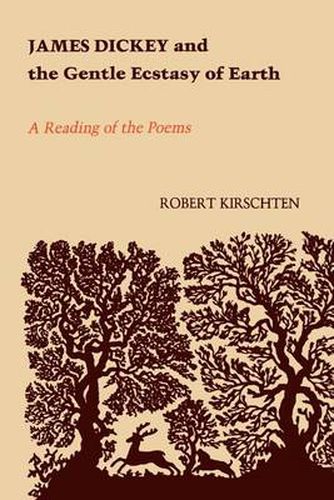Readings Newsletter
Become a Readings Member to make your shopping experience even easier.
Sign in or sign up for free!
You’re not far away from qualifying for FREE standard shipping within Australia
You’ve qualified for FREE standard shipping within Australia
The cart is loading…






This title is printed to order. This book may have been self-published. If so, we cannot guarantee the quality of the content. In the main most books will have gone through the editing process however some may not. We therefore suggest that you be aware of this before ordering this book. If in doubt check either the author or publisher’s details as we are unable to accept any returns unless they are faulty. Please contact us if you have any questions.
Robert Kirschten maintains that most formal analyses of Jams Dickey’s poetry have been unsatisfactory or at best only partially complete. Some critics have labeled Dickey an American romantic, while others have called him a mystic, a pantheist, a comic poet. In James Dickey and the Gentle Ecstasy of Earth, Kirschten provides a fuller understanding of Dickey’s lyric vision by employing what Ronald Crane calls multiple working hypotheses. The first three of these, mysticism, neoplatonism, and romanticism, serve primarily to align general traits in Dickey’s poetry with familiar literary traditions. The fourth of Kirschten’s hypotheses, primitivism, is drawn from the field of anthropology. Kirschten shows that such anthropological concepts as magic, rites of passage, and ritual violence are vital in describing Dickey’s central methods. After synthesizing the four hypotheses to establish a critical base, Kirschten investigates three crucial elements in Dickey’s poetry: his lyric speakers, central narrative devices, and poetic diction. The final chapter, in a culmination of the entire investigation, offers a reading of the long poem The Shark’s Parlor. Kirschten’s study reveals a sure grasp of the philosophical principles of literary criticism as well as a wide range of reading, especially in the literature of romanticism. This lucid examination gives us genuine new insights into the work of one of the country’s premier poets.
$9.00 standard shipping within Australia
FREE standard shipping within Australia for orders over $100.00
Express & International shipping calculated at checkout
This title is printed to order. This book may have been self-published. If so, we cannot guarantee the quality of the content. In the main most books will have gone through the editing process however some may not. We therefore suggest that you be aware of this before ordering this book. If in doubt check either the author or publisher’s details as we are unable to accept any returns unless they are faulty. Please contact us if you have any questions.
Robert Kirschten maintains that most formal analyses of Jams Dickey’s poetry have been unsatisfactory or at best only partially complete. Some critics have labeled Dickey an American romantic, while others have called him a mystic, a pantheist, a comic poet. In James Dickey and the Gentle Ecstasy of Earth, Kirschten provides a fuller understanding of Dickey’s lyric vision by employing what Ronald Crane calls multiple working hypotheses. The first three of these, mysticism, neoplatonism, and romanticism, serve primarily to align general traits in Dickey’s poetry with familiar literary traditions. The fourth of Kirschten’s hypotheses, primitivism, is drawn from the field of anthropology. Kirschten shows that such anthropological concepts as magic, rites of passage, and ritual violence are vital in describing Dickey’s central methods. After synthesizing the four hypotheses to establish a critical base, Kirschten investigates three crucial elements in Dickey’s poetry: his lyric speakers, central narrative devices, and poetic diction. The final chapter, in a culmination of the entire investigation, offers a reading of the long poem The Shark’s Parlor. Kirschten’s study reveals a sure grasp of the philosophical principles of literary criticism as well as a wide range of reading, especially in the literature of romanticism. This lucid examination gives us genuine new insights into the work of one of the country’s premier poets.